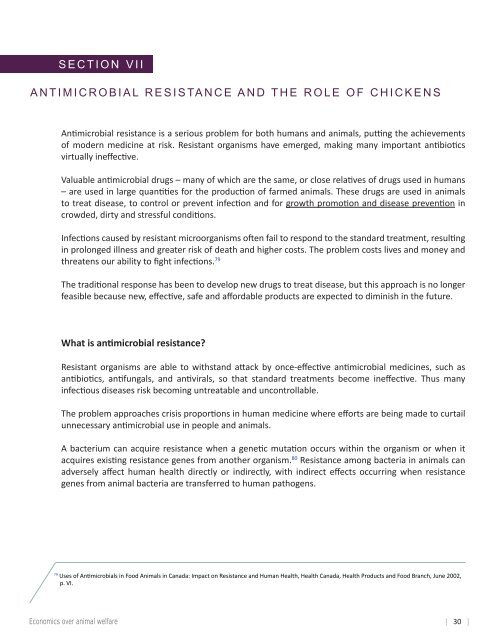You also want an ePaper? Increase the reach of your titles
YUMPU automatically turns print PDFs into web optimized ePapers that Google loves.
SECTION VII<br />
ANTIMICROBIAL RESISTANCE AND THE ROLE OF CHICKENS<br />
Antimicrobial resistance is a serious problem for both humans and animals, putting the achievements<br />
of modern medicine at risk. Resistant organisms have emerged, making many important antibiotics<br />
virtually ineffective.<br />
Valuable antimicrobial drugs – many of which are the same, or close relatives of drugs used in humans<br />
– are used in large quantities for the production of farmed animals. These drugs are used in animals<br />
to treat disease, to control or prevent infection and for growth promotion and disease prevention in<br />
crowded, dirty and stressful conditions.<br />
Infections caused by resistant microorganisms often fail to respond to the standard treatment, resulting<br />
in prolonged illness and greater risk of death and higher costs. The problem costs lives and money and<br />
threatens our ability to fight infections. 79<br />
The traditional response has been to develop new drugs to treat disease, but this approach is no longer<br />
feasible because new, effective, safe and affordable products are expected to diminish in the future.<br />
What is antimicrobial resistance?<br />
Resistant organisms are able to withstand attack by once-effective antimicrobial medicines, such as<br />
antibiotics, antifungals, and antivirals, so that standard treatments become ineffective. Thus many<br />
infectious diseases risk becoming untreatable and uncontrollable.<br />
The problem approaches crisis proportions in human medicine where efforts are being made to curtail<br />
unnecessary antimicrobial use in people and animals.<br />
A bacterium can acquire resistance when a genetic mutation occurs within the organism or when it<br />
acquires existing resistance genes from another organism. 80 Resistance among bacteria in animals can<br />
adversely affect human health directly or indirectly, with indirect effects occurring when resistance<br />
genes from animal bacteria are transferred to human pathogens.<br />
79<br />
Uses of Antimicrobials in Food Animals in Canada: Impact on Resistance and Human Health, Health Canada, Health Products and Food Branch, June 2002,<br />
p. VI.<br />
Economics over animal welfare [ 30 ]


